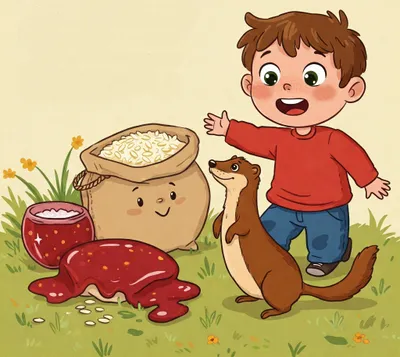Pop Goes the Weasel

Lyrics
Half a pound of tuppenny rice,
Half a pound of treacle,
That’s the way the money goes,
Pop! goes the weasel.
Up and down the City road,
In and out the Eagle,
That’s the way the money goes,
Pop! goes the weasel.
Every night when I go out,
The monkey's on the table,
Take a stick and knock it off,
Pop! Goes the weasel.
A penny for a ball of thread
Another for a needle,
That’s the way the money goes,
Pop! Goes the weasel.
All around the cobbler's bench
the monkey chased the people;
The donkey thought ’twas all in fun,
Pop! Goes the weasel.
Half a pound of treacle,
That’s the way the money goes,
Pop! goes the weasel.
Up and down the City road,
In and out the Eagle,
That’s the way the money goes,
Pop! goes the weasel.
Every night when I go out,
The monkey's on the table,
Take a stick and knock it off,
Pop! Goes the weasel.
A penny for a ball of thread
Another for a needle,
That’s the way the money goes,
Pop! Goes the weasel.
All around the cobbler's bench
the monkey chased the people;
The donkey thought ’twas all in fun,
Pop! Goes the weasel.
History and Meaning
The words come from Cockney Rhyming slang, which is a form of slang that originated in the East End of London. The slang uses a rhyming association, so for example 'apples and pears' would mean stairs, 'bees and honey' means money, and 'rattle and clank' would be for a bank. The second word was then dropped, so we just have 'apples' for stairs, 'bees' for money, and 'rattle' for a bank. The slang was used to make it hard for outsiders (or the police) to understand what they were saying.
Meaning of the words
- 'Pop' is to pawn (to 'temporarily' sell possessions when in desperate need of money)
- 'Weasel', from cockney slang 'Weasel and Stoat' meaning coat
So, 'Pop goes the weasel' means they were so desperate for money they had to pawn their coat
- 'In and out the Eagle', which refers to an old pub in North London - 'The Eagle Tavern'.
- some versions of the rhyme refer to a 'monkey', which would mean £500. As £500 was so much money at that time, it would likely be someone pawning the tools of their trade, such as a tailing iron.